#resuscitation of evilness
Explore tagged Tumblr posts
Text
starting this geta and caracalla x reader fic and realizing with horror that im 2.2k words into the first chapter and not even a quarter of the way done with what i want to happen in it AND THERE ISNT EVEN GOING TO BE GETA AND CARACALLA IN THE FIRST CHAPTER 😭😭😭😭😭
anyway heres a sneak preview
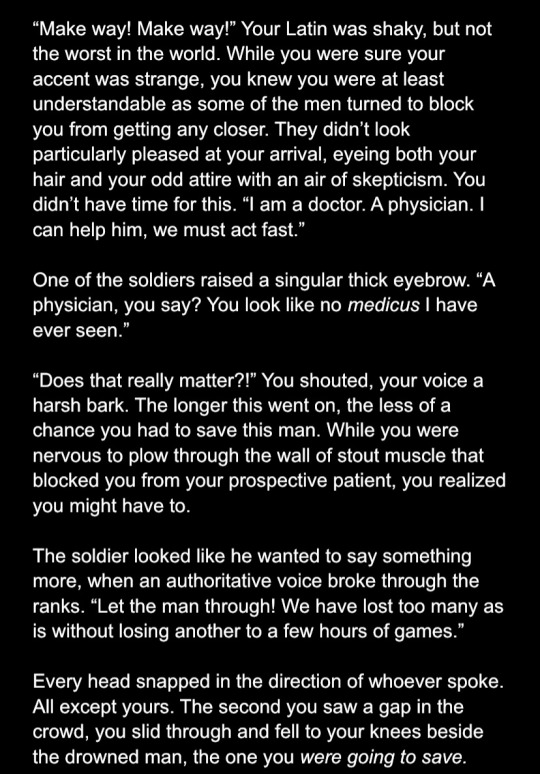
#emperor geta x reader#emperor caracalla x reader#dnbts#do not blame the sea is the title of this thang btw shout out to the greek idiom if you cannot catch any fish do not blame the sea#anyway the guy who gets resuscitated wound up an Actual Character while i was plotting#sorry chat#yn needs friends who arent evil and mean and demented and evil and ginger#i do have so much planned for this AND I ACTUAL HAVE A PLANNING SHEET FOR ONCE#FOR ONCE LMFAO#anyway everyone say fuck my stupid baka job ill see what i can get done tho#wish i could just write fanfic all day everyday and chill#chilling in a village outside of a city when a guy drowns and ur like fuck ok cpr i sure hope this doesnt bite me in the ass#and then it bites you in the ass
38 notes
·
View notes
Text
Explosion
This was a Valenfield fic I wrote with Pinterest prompts, which I'll list below before the fic!
Keep breathing, you’re doing great; No, don’t go to sleep. Hey! Eyes open! I can’t find a pulse; Come on, breathe! Please don’t leave me
Chris leans forward, flipping his turn signal so he can move into the next lane. Jill is snoring softly in the passenger’s seat, and the rest of Alpha S.T.A.R.S. team is asleep in the backseat. It’s a few more hours before they’re going to reach the site of their newest mission. The mission itself is supposed to be simple. There are riots going on in a small town over something the mayor did, and they’ve gotten violent. The police station only has a few employees, and they called in for backup when they started getting bomb threats. So, S.T.A.R.S. were called to come rendezvous with the police so they can help. Even hours of driving later the roads are still quiet, and they’re the only car on the road.
It’s odd since normally Wesker is driving his car in front of Chris no matter where they’re going, but he had to stay back this time. Not that he’d tell them why, but Chris has learned not to question him too much. He’s a busy guy, and they’re perfectly capable of handling small town riots.
Though I do wonder why we were called in for this. It seems a bit below our paygrade. Not that I’m complaining, it’s just odd, Chris thinks as he sees the town limits sign come into view. It’s also so quiet. I know this place is pretty out of the way, but there hasn’t been a single person since I got off the highway.
Jill stirs, stretching. She barely misses Chris’ face, and he smiles, his mind taken off of his questions instantly.
“Hey, we’re almost there. You should start waking up,” Chris says, gently touching Jill’s arm.
“Mh, ok.”
She straightens up in her seat, rubbing her eyes. Chris glances at Jill one more time before turning all of his attention back to the road. Chris notices a shadowy figure on the porch of the first house they past, but whoever it is quickly scurries into the darkest corner of the porch where he can’t see them anymore.
“Did you see that?” Chris asks.
“No, I don’t see anything. Though it’s really dark now, so that’s probably why. What was it?”
“Not sure. More likely than not, I’m on edge cause of how quiet it’s been. Don’t worry about it.”
Neither of them speak again until Chris pulls into the parking lot of the motel they’re going to be staying at until it’s time to go home.
“Can you start waking the guys up? I’ll get the rooms, and then they can get unpacked while I head to the police station for the briefing.”
“Yeah, I can do that, and I’ll go with you to the precinct after.”
Chris nods, climbing out of the car. He checks in, and gets keys. Everyone is out of the car, and grabbing their gear when he gets back out. He hands all of the keys to Joseph, and turns back to Jill.
“You ready to go?”
She nods.
“Ok, then we’ll let these guys get their stuff out of the car, then get this show on the road.”
It’s only a few more minutes before they’re back on the road, Chris still in the driver’s seat.
“You must be tired,” Jill comments.
“I mean, of course I am. We had a mission that lasted thirty-six hours, and then I had to drive everyone here. It’s been a long two days.”
“Don’t worry, I’ll make sure the guys leave you alone when we get back. We’ll have an early morning since we’ll have to make our plan of attack, but it’s early enough to get some rest.”
Chris laughs. “Yeah, I appreciate it.”
Jill bumps his shoulder. “What are partners for?”
Chris smiles gently. The precinct has cars outside, and the lights are on, but there’s no one outside. Chris feels his chest get tight. Something feels off, wrong.
“Be on guard. I have no idea why there’s no one out right now, but it’s weird,” Chris says, opening his car door.
Jill nods, her hand going for her gun, though she doesn’t pull it out. She rests her hand on her holster. Chris walks up to the doors, and pulls them open. They’re unlocked, so they head inside. A man in a blue officer’s uniform is sitting behind the desk, but he’s the only person in sight.
“Hello, I’m Chris Redfield, and this is my partner, Jill Valentine. We’re from S.T.A.R.S., and we were sent to help with the political unrest. We’re supposed to be talking to the police chief.”
“Ah, yes. He’s briefing everyone in the conference room, but I’ll take you to his office. You can wait there for him to be ready.”
Chris looks back at Jill, then turns to the officer. He raises an eyebrow at Jill.
“Would you be willing to drop my partner off at the office, and then run through some numbers with me? I would love to have some additional information that we don’t have to bother the chief with,” Jill says, catching on to Chris’ unease.
At least if something happens, she’ll be able to contact the others. Though I shouldn’t be worried about it, they’re cops too, and we were sent here by Wesker. I’m only being paranoid.
“It would be ok for you to go with your partner, Miss Valentine.”
“I think I’ll stay here, and you and I can talk. I don’t mind waiting if someone comes in needing to talk to you.”
The officer smiles, though it looks more like a grimace. “Alright, come with me, Mr. Redfield.”
Chris narrows his eyes, but follows the man through the station to the chief’s office. He opens the door, which is already unlocked, and motions for Chris to sit down on the opposite side of the large, wooden desk.
“How long do you think the briefing is going to take?”
“Yours?” the officer asks, looking confused.
Chris narrows his eyes. “No, the one that the chief is in right now .”
“Oh, shouldn’t be more than fifteen minutes. Sit tight.”
He steps out, and Chris immediately stands up. He’s too jittery to stay seated, though there’s no logical reason for him to be. He waits ten minutes, pacing around the office before walking over to the window. It’s nailed shut, and Chris cocks his head to the side in surprise upon noticing the nails.
“What the hell?” he whispers, reaching out to touch the pane.
It’s not cold, something that also sets off alarm bells in Chris’ head.
“Glass shouldn’t be thick enough to keep the cold out entirely. What is going on?” he mumbles, walking towards the door.
He tries the knob, but it doesn’t turn. Everything in him is screaming that he’s trapped, and they were set up. He races back to the window to see if he can get the nails out. It would be a tall jump, but not an impossible one for him to make without hurting himself. He’s about half-way there when he hears something ticking.
The officer takes a long time coming back. When he does, Jill tries to ask him a few questions about town, and where the riots were, but he interrupts her with his own questions.
“Wasn’t all of S.T.A.R.S. supposed to come to get briefed?”
“Yeah, but we were all pretty tired. We came here straight from another mission, so we’re just going to brief them ourselves.”
“So where are you guys staying?”
“I don’t think that really matters. What does is where the riots are happening. Where do we need to start, and do you have any idea who could be orchestrating them?”
The officer, whom Jill just realized she never caught his name, glances at his watch.
“I have something I have to check on outside, but then I can answer all of your questions.”
He rushes out before Jill can even respond, leaving her completely confused. “What is going on here? This is weird, and it’s getting really ridiculous.”
Jill folds her arms, one hand still loose enough to reach her gun. She waits another minute, then follows the man outside. She doesn’t see him, and the Jeep that was parked outside when they arrived is gone. That leaves squad cars, and Chris’ truck as the only cars in the lot.
Where did he go?
She peeks across the lot, trying to see if he’s smoking a cigarette in the corner or something, but there’s no one there. The whole area is dead quiet, just like the entire town has been. The only person she’s seen thus far is the officer, though Chris saw someone while he was driving, and he had to have spoken with someone to get their room keys. Jill turns to head back inside, and wait for someone else to show up, or for the officer to come back when the whole building blows. All of the windows blow out, and it’s enough to throw her off her feet even from a few feet away. She’s barely able to bring her hands back in enough time to stop her head from hitting the concrete though her hands are stinging from scraping the concrete. It takes Jill another few seconds to sit up, and register what just happened.
“Chris!” she screams, stumbling to her feet as fast as she can. Her lungs won’t fill with air as she stares at the burning wreckage for a second.
This was intentional. They meant for all of us to be here. That’s why he was asking, but why?
She races around the building to see if Chris might have gone out of the backdoor. The area is lit up from the flames, though she can’t hear any sirens, and she has no idea if anyone is coming. It’s the police department after all, and this was a targeted attack. That much she’s sure of now. Then she sees the curled body slumped a few yards away from the burning wreckage. She recognizes Chris’ build instantly, and reaches him in a few seconds.
She flips him onto his back, entirely forgetting about spinal injuries, and proper first aid protocols. Her heart stutters in her chest. Burns cover his right arm, extending towards his hip too. There’s blood on his lips, and splattered on his clothes and the ground. There’s a shard of something lodged in his chest, and more small pieces in his left arm.
He must have been thrown through the window.
His head is also bleeding, and his eyes are half open. Her hands are shaking more than she’d like to admit when she reaches for the pulse point on his throat. His eyes blink, and suddenly he’s trying to focus on her face. His breath comes out as a wet rasp. Jill rips her jacket off, trying to staunch the bleeding from the gash across his head. The shard is doing a good enough job stopping the external bleeding with that injury, so she doesn’t bother with that right now since she can’t do anything about the internal bleeding. She turns him on his side, eyes scanning his face. He continues to rasp, though it’s weaker and quieter now.
I have to get him help right now. Sounding like that, his lungs aren’t going to make it much longer.
Jill looks around, spotting another establishment in the distance.
I don’t have a phone, but they might.
She looks back at Chris, trembling at the sight of him. He’s getting paler by the second, but his eyes are still open.
“Ok, keep breathing, you’re doing great. I’ll be right back, ok? I’ll be right back. Just hang in there for me, tough guy.”
Then Jill is running, she’s running faster than she thought she could. She calls the hotel, and has them transfer her to the only room number she caught. Barry is the one to pick up, which is good since he’s the only one other than Chris that can understand her when she gets incoherent. Though it’s not normally from desperation and fear. She explains that the precinct blew up, and Chris is badly injured. She had no idea how to call the hospital, or if there’s even one in town that can handle his injuries.
“Ok, all you need to do is try to keep him stable, and I’ll handle everything else. Don’t worry, we’ll be there soon. Get back to him, ok?”
“Ok,” Jill stutters out before tossing the phone back to the shop owner.
She’s racing back to Chris, finding him exactly where she left him. The first thing to hit her is how quiet it is, and she looks down to see that his chest isn’t moving. He’s trying to pull his eyes back open, but it’s obvious that if he is still breathing, he’s barely pulling in any air. Jill places her head lightly on his chest, not even feeling a wisp of air. She drops Chris onto his back, and forces his chin up. Then their lips are on each other, and it’s nothing like what she imagined. He’s cold, blank, and she’s overwhelmed by the taste of copper.
Three sets of rescue breaths later, and his eyes are beginning to close again. Jill, slightly out of breath herself, slaps his face lightly.
“Don’t go to sleep. Hey! Eyes open, Redfield!” she exclaims, slapping his face a little harder now.
Despite her efforts, his eyes finally shut. She reaches for his neck again, almost collapsing when her fingers make contact.
“I can’t feel a pulse,” she whispers, blinking harshly.
It takes a few more seconds for that to sink in, and her hands on already on his chest by the time it does. It feels wrong, angling her hands to avoid any more damage to his chest injury, but doing nothing means he’s not coming back. Jill can’t live with that, so she pushes down, trying to keep herself steady as blood makes her hands slick.
“Please don’t leave me, Chris,” she whispers before giving him two more rescue breaths.
A rib cracks, and Jill gasps back a sob.
“Come on, breathe.”
Another round of compressions, two rescue breaths, and another round of compressions later, and Jills arms are starting to burn.
“Damn you! Breathe! You don’t get to leave me,” she cries.
There’s no response from the still body beneath her hands, and she can feel tears start slipping down her cheeks. She doesn’t stop though, because that would mean giving up. She could never give up on her partner, the only person who had never given up on her either. Chris wasn’t the person she connected to the fastest, but something drew her to his quiet demeanor, and goofy personality. Maybe it was the way he would give her a small smile, and say good morning to everyone in the office before going to his desk to work on paperwork. Or the way he would wrap her hands before training to make sure she didn’t get hurt since he knew she wasn’t good at it herself. Or the way he started to bring coffees in for her, and have them waiting on her desk when she arrived on Mondays, because she was always too late getting up to get one herself.
In all honestly, it was probably the fact that she could list a dozen other things he does for her because he knows her, and she never had to ask him to do a single one of them. Life without Chris is playing as a harsh reality in Jill’s head as her hands are the only thing keeping his heart beating, and it feels unbearably empty. Not having anyone to do paperwork with when it got to be a lot of work, and not having someone to call on Saturday nights to make sure he didn’t get too drunk to get home. Jill thinks of his little sister that he promised she could meet some day, and she never considered that day could be his funeral. She can almost imagine Wesker’s monotone voice from his office as he makes the call to tell her while Jill tries not to break down looking at Chris’ jacket on the wall. Sirens break her out of her thoughts, and it immediately hits her how badly her arms are burning. Then Jill’s being swarmed by paramedics, and they’re talking, but everything is blurring together.
Arms wrap around her waist, pulling her further back, away from Chris. Blood drips from the tips of her fingers, and then she’s collapsing, tears streaming down her face. Barry carefully lowers her to the ground, kneeling next to her. Joseph is off to the side, on the phone, and Brad is watching Chris with wide eyes, fear and horror etched into his features. Jill tries to look back at him, to see what’s happening, but Barry turns her head into his chest.
“Don’t look,” he whispers, and Jill only cries harder.
Everything is crashing down, and all she wants to know is if he’s going to make it.
“He couldn’t,” she gasps. “He couldn’t breathe. They have to help him, he couldn’t-”
Her vision spins before the world goes black. Jill wakes up to find herself in a white bed. It takes a few seconds for the memories of everything to crash down on her, but she’s sitting up as soon as it does. Barry is sitting in a chair beside her bed, looking worn out.
“Barry.”
“Hey, don’t get up yet. They want to keep you under observation for a while.”
“Chris?”
“He’s in surgery right now. He made it here, but I haven’t heard anything since then.”
“How long have I been out?”
“All night. We talked to Wesker, and he’s sending Beta team down here to deal with the cops. Turns out, the riots were actually because of corruption throughout the system, and the person who called us down actually wanted help with the cops. He planned to meet us at our hotel so he could explain everything to us, but they got to him first. It ‘wasn’t safe’ to tell us over the phone.”
Jill blinks.
“But since they got to him, they planned to blow the precinct with us in it, and blame the protesters. That’s why he was questioning where everyone else was.”
“I feel like I’m going to be sick.”
“Take a breath. Freaking out won’t help anyone right now.”
Jill rolls her eyes, but forces herself to take a deep breath.
“I guess we just wait then?”
Barry nods, grimacing.
Chris blinks, annoyed by his alarm going off.
Why does my chest feel so heavy? Damn everything hurts so much.
His whole body feels like it’s weighted, and his chest only hurts more the closer to awareness he gets. Something is cutting into his face, so he clumsily reaches up to push it away.
“Hey, leave it,” a soft voice says, catching his hand half-way to his face.
Chris turns slightly, wondering if he could convince Jill to turn off his stupid alarm. It isn’t until he catches sight of the monitor with spiky lines that he realizes the beeping isn’t his alarm clock.
Right, we’re on mission. Wasn’t I just driving? No, the police station, but what happened?
“Hmn,” is the only thing he manages to get out.
Jill is rubbing her thumb across his knuckles, her face set into a tight smile. They stay like that for a few minutes before Chris is finally able to attempt talking again.
“Jill?”
She looks back at his face, her smile turning genuine. “You’re actually awake? Chris, I was so scared,” Jill says, leaning forward to carefully wrap her arms around Chris’ shoulders.
Chris grunts. “What happened?”
“The precinct blew up. It’s a long story, but you got hurt pretty badly.”
Jill’s eyes get a little glassy, and she reaches up to gently touch her lower lip. Chris frowns.
“Are you alright?” he rasps, his voice still scratchy.
She laughs. “Yeah, I’m fine, and you’re going to be too. No work for a while, and some physical therapy, but you’ll live.”
Chris smirks. “Like I’d kick the bucket over an explosion.”
Jill rolls her eyes. “Yeah, sure… I’m really glad you’re ok.”
Chris grabs her hand even as his eyes start to feel heavy again. He lets the darkness overtake his vision with Jill’s smiling face being the last thing he sees before falling back into sleep.
#resident evil#chris redfield#jill valentine#hurt/comfort#angst#heavy angst#bombing#s.t.a.r.s.#joseph frost#barry burton#brad vickers#cardiopulmonary resuscitation#hospitals#hopeful ending#pre slash#pre canon#whump writing#writing#writing prompts
7 notes
·
View notes
Text
this gonna be me if i ever get to gaze upon chris redfields fat bagonzas irl

11 notes
·
View notes
Text
.
#fent is a fucking evil drug#had to resuscitate my friend today#she lived thank god#but there’s no feeling like running outside to find your friend on the side of road blue and lifeless#carry n@rcan learn to use it. protect ur community
6 notes
·
View notes
Text
What if you were a METH ADDICT, who came from an ABUSIVE HOUSEHOLD, and then you decided that you wanted to TRY AND BE GOOD (OR/AND FIND NEW DRUGS), so you went to a shady lab in MALAYSIA, and then you kinda DIED, and then you RESUSCITATED with GODLIKE POWERS, and some shady Russian blonde presented you with ADOPTION PAPERS, and saved you from your crushing evil alter ego depression with the POWER OF FRIENDSHIP-
5K notes
·
View notes
Text
can you imagine being simon petrikov. the love of your life sacrificed herself to cure you from a cursed crown that trapped you in your own head for like a thousand years. you are the last living remnant of a time long gone. you dont know how to live without your fiance so you keep trying to summon her through increasingly morally grey acts. you want to die so fucking bad. god put a whole universe in your brain as a little treat for himself. a little girl keeps coming to your museum house to tell you she wants you to go back to being in fucked up. you are keeping an evil goose in a cage in your house and it mocks you. your daughter doesnt really need you as much as you need her and she has her own life now. the only way you can make a living is by capitalizing on the horror of your own displacement. while trying to summon your wife, a cat came out of the back of your head and proceeded to destroy your house and your shrine to your wife. you had to resuscitate the shitty evil goose to try to summon your wife again. This time a whole human woman came out of the back of your head. you really want to believe that she is just a manifestation of your prior madness. the goose is fully dead now and you have no more options in the way of getting your wife back. you go dissociate in the shower. god summons you in the nude to his fucked up room in front of the manifestations of your madness, now on-model to how theyre supposed to look. and then he shows you your final moments with your beloved fiance. and everyone is like wow simon you suck now. youre so lame now why are you so sad and stupid and lame. and theyre like dude just like get over it go do something else lol. you try to give up and god puts you on a fucking conveyor belt and tells you to perform the same ritual that youve been trying to use to get your wife back this whole time so you can put his favorite little guys back in your brain. their whole world is shitty because youre a normal guy now and they both want their world to be better and magical. heres a really good option for you: go back to being the fucked up guy that everyone wishes you were and essentially fade from existence while that guy takes your place everyone wins but you youre basically killing yourself and relapsing in one move. who gives a shit. might as well. youve got nothing to live for anymore anyways.
5K notes
·
View notes
Text
lifeguard!james potter x fem!reader 8
prev
wc: 2168
cw: drowning and resuscitation, near death experience, inaccurate medical descriptions, happy ending ofc
me: i have a delicious lifeguard!james request in my inbox which will for sure be the next part but i really wanted to get this part out first sorry anon!!!!! ik this is a little less horny than most of the other parts but i kinda loved the idea of the softness and love of their relationship developing after being braindead horny?? but as always pls feel free to send lifeguard!james reqs bc he's my man fr im feral for him
TAG: @stanzie
════ ⋆★⋆ ════
the pool was packed. you didn’t know what was different from any of the other hot, sweaty days you’d encountered, but suddenly there was hardly a sun bed free or an inch of space in the pool.
it was disappointing, sure, but nothing your friends couldn’t handle, snatching a piece of grass a bit further from the pool to lay your towels down. it did mean you didn’t have the benefit of an umbrella to hide under, and the direct heat was driving you all mad.
“do you think we’ll even fit?” you asked, not hopeful when you could barely even see the water.
“we come here every other day, they have to make room for us,” lily joked, tucking her magazine back in her beach bag.
“you could always ask james for help,” mary teased with a singsong emphasis on his name. you rolled your eyes, attending to your sun cream to hide the girlish grin that was fighting its way out.
“yeah, bat your eyes at him and he’d clear the whole facility,” marlene laughed, jumping up and holding a hand out to help you stand, “now let’s go fight the old ladies for a spot.”
“hiya,” you called up to james on the elevated lifeguard chair. he brightened as soon as he noticed you, pushing his dark sunglasses up to his forehead so he could make direct eye contact.
“hey, good looking! not in your usual chair?”
“got beaten out by hilda. embarrassing, really. got eyes on any spots for us, baywatch?” james took his duty seriously, scanning the pool for any spots of blue for you to occupy.
“how about down there by the wine mums? good bit of room and i’ll be able to keep an eye on you.” he winked, gesturing down to the group of middle-aged women.
“okay perv,” you replied light-heartedly, but you couldn’t help your smile when he used your nickname for them. the wine mums were a group of women your friends adored from afar. they weren’t drunk as the name suggested — no alcohol allowed inside the pool fences — but all year round they could be found about town, gossiping and laughing well into the night over glasses of red or white. you couldn’t go an encounter with them without at least one of your girls wistfully dreaming about you all becoming wine mums like them in thirty years. it made your heart glow that james had picked up on the nickname.
you slipped into the pool, sighing contentedly as the water immediately brought you relief. there was a group of children playing some sort of ball game, maybe a casual version of water polo, which habitually splashed you all, but you weren’t in the mood to care.
the chaos only became unpleasant after another group of schoolboys came barrelling in, joining in on whatever game had started. even the wine mums climbed out of the water, muttering complaints about their behaviour.
the pool was overrun with adolescent boys, jumping and thrashing and tossing a few balls around recklessly. james had blown his whistle several times, but he couldn’t exactly stop them from playing around.
the next several moments happened like you were watching from an outside perspective. the exact moment you opened your mouth to speak, the ball smacked into the back of your head with an aggressive thwap, dunking your face under the water, your lungs filling with water as you gasped and floundered. in the most evil twists of fate, the mob of teenage boys flocked over to you in hunt of the ball, pushing you down to the pool floor.
if you were in your right mind you might’ve acted differently, more rationally. but you weren’t in your right mind. you were under the water, being pummelled by at least six pairs of feet with water filling up in your lungs. you weren’t the dramatic type, but you were genuinely scared for your life, the possibility of resurfacing in time rapidly dwindling. your already blurry vision under the surface darkened and you tried to make peace with the fact that you weren’t getting another breath in.
the next thing you knew, your chest was heaving and something warm was resting over your mouth. your eyes shot open, body jerking even more dramatically. james potter, in all of his wet, hot glory, was giving you mouth to mouth as you lay helpless on the hot pool tiles. you’d clearly been out for a few minutes as someone had been able to lay a towel beneath you so your skin didn’t blister and burn on the scorching terracotta.
you hacked and coughed a few more times as james gave you a few inches of space, water spitting up and out of you, splashing pathetically on the floor. you noticed the alarming silence that had fallen over the facility, and looked up to face two dozen pairs of eyes fixated on you. it made you nervous in a way attention never had, fighting your body’s automatic reaction to expel water in order to keep some of your dignity.
“alright, everyone, show’s over. give us some space.” james’ usual boyish mischief was long gone, serious expression only intensifying as you locked eyes. “you go with lily to the medical room. i’ll see you there soon to make sure everything’s really fine, but i’ve gotta wait until someone comes to cover, the pool can’t be unsupervised.”
“i get it,” you sighed dramatically, leaning on lily as she helped you up, “duty calls.” james shot you a look that was clearly meant to be unimpressed, but you could see the hint of amusement in the twitch of his smile.
“i’ll see you soon.”
lily escorted you inside the tiny, outdated medical room, sitting you up on the examination table.
“that was hands down the most dramatic thing that’s ever happened to us,” she said, sitting in the seat usually saved for the parent.
“you’re telling me,” you managed a laugh, “what happened?”
“god, it all happened so fast we could barely keep up. you got separated under that group of dickheads and it was all so loud we couldn’t get them off of you so we had to call james for help. now, i’m only saying this because you’re okay and i know you’d be mad at missing it, but it was the hottest thing i’ve ever seen.” you interrupted her retelling with a snort, not not disagreeing with her. “he was full baywatch; olympic level dive, across the pool in seconds, carried you out of the water bridal style like some sort of superhero. i could’ve been watching a movie! did some legit looking cpr while absolutely ripping those boys a new one for being so irresponsible — think one of them cried.”
you laughed at lily’s dramatic recount, imagining it like you’d been conscious to witness.
“i’m so upset!” you jokingly whined, “nothing fun ever happens and the one time it does i’m unconscious! i didn’t even get to see him use all those stupid muscles.”
“you know you can just ask, right? you all tease me for my ego but never use it for good.” james rounded the corner, looking extremely satisfied with himself. you and lily exchanged mortified eye contact at being caught, but both dissolved into embarrassed giggles as james’ disarming nature charmed the room.
“do you want me to stay?” lily asked as james gathered his things to examine you.
“it’s okay,” you shrugged, “i trust the doctor.”
“good, i think marlene and mary are pretty shaken up, i should probably walk them home. call me tonight to prove you’re still alive.” you agreed easily, making lily promise to assure all your friends you were perfectly fine.
that left just you and james alone in the medical room, tension blossoming between you.
“are you okay? really okay?” he asked, beginning the checkup.
“yeah,” you answered, hesitating to think through your reply, “shaken up a bit i think. and my lungs hurt. but you can’t get rid of me that easily.”
“good.” james smiled, listening to your heartbeat for abnormalities.
you sat in silence for a few minutes, observing as james did his thing, admiring the way his eyebrows furrowed when he was focused.
“thanks for saving me,” you broke the silence first.
“don’t thank me, it’s my job.”
“no, seriously. i could have died, james.” james looked up with a start, his eyes finding yours. he couldn’t remember if you’d ever called him by his real name and not some nickname to tease him. he liked the way it sounded coming out of your mouth.
“you know i never would have let you drown, who else would stare at my body all day?”
“shut up.” you swatted his bicep, secretly grateful for the tone shift. you wanted james to know you were sincerely grateful, but it was hard to sit in that vulnerability. you liked having the power in conversation, controlling it so you always had something witty to say. today had been one big knock down, leaving you to feel powerless and out of sorts, like nothing you did was right.
james had you taking deep breaths in and out, describing how they felt and if you could feel any water in your lungs or other disruptions in the process. his hand on your back was burning a print into your skin, his presence beside you a reminder of everything wonderful about him.
you suddenly groaned, throwing your hands up to cover your face in embarrassment. when james asked for an explanation, you almost couldn’t provide one.
“that is so not how i wanted our first kiss to go.” mouth to mouth? definitely one of the least sexy kisses of all time. blowing air into an unresponsive mouth was certainly not what you’d consider a successful make-out, and you were sure james agreed. to your surprise, james looked amused rather than disgusted or judgemental, his casual demeanour once again bringing you peace.
“nah, that wasn’t a kiss. a kiss is supposed to be fun. and consensual. that was just me saving your life.” you rolled your eyes to cover your smile. you both pretended you couldn’t see the other’s giddy grin at the implication that you did in fact plan on kissing james.
“so what’s the diagnosis, doc?” you changed the subject again, nervous sitting so close to him in a private room (especially when his bare chest was still out in his work uniform, glistening with sweat).
“you’re all good to go, but i’d go to a doctor if you feel weird. be cautious for a few days.” james held out his hand to help you off the bed.
“well if it’s really that bad, i could call on you, right? i’m sure the good doctor wouldn’t mind supervising my bed rest, hm?” your flirting was back with full force, paired with some batted eyelashes for good measure. you delighted in watching james understand the implications, blush rising to sit on his already sun-kissed cheeks.
“what about we start with me walking you home, hm? i don’t think your mother would be pleased with me supervising any activities happening in your bedroom.” you laughed at that, tipping your head back as james took the moment to take your beach tote and sling it on his own shoulder.
“that’s why i have a window, stupid.” you let yourself be led home by james, the two of you laughing and talking until you reached your front door.
you stood on the first step of your small porch, making you closer to level with james’ towering height. you could tell he was about to say something, no doubt flirt or make a dumb joke, but you beat him to it, wrapping your arms tightly around his midsection.
you’d clearly caught him off guard as james took a moment to react, but matched your energy, wrapping you tightly against him until you could practically feel each individual muscle in his body — not that that would be a bad thing.
“i’m really glad you’re okay,” he said softly as you finally pulled away, “you had me really scared there, lovely.” you only smiled in response, unable to produce the same openness that seemed to come so easily from james. you liked to have the last word, though.
“you really earned your title today, baywatch.” you kissed his cheek softly before disappearing into your house to giggle in a way usually entirely unlike you. you were scared this thing you had with james wasn’t just about his lifeguard’s body anymore.
#giasfics˚ ༘♡ ⋆。˚ ❀#love#fluff#james potter#james potter x y/n#the marauders#marauders#marauders era#hp marauders#dead gay wizards#james potter fluff#james potter x you#james potter x reader#james potter imagine#lifeguard!james#lifeguard james#lifeguard!james potter#harry potter#james potter fic#james potter fanfiction#james x reader
131 notes
·
View notes
Text
SV Malevolent AU where, due to a system error (Shen Jiu not actually dying from the qi deviation? Mu Qingfang being present and resuscitating him in time maybe?) Shen Yuan ends up only half-possessing SJ by gaining control of his eyes.
SJ, of course, fully believes that he's been possessed by a demon and wants to evict the creature in question as soon as possible. However, he's still a paranoid bastard before anything else, so his first attempt is to just quietly do it himself after chasing Yue Qingyuan and anyone else away from his house. He doesn't want either a reputation for being weak and susceptible to possession, or one for having ties to demonic influence. There's enough grime on his reputation and the ONE thing he has confidently never been at risk of adding to it was consorting with demons, and he'd like to keep it that way.
Except, of course, Shen Yuan's not a demonic spirit, so none of the efforts to "evict" him actually work. Much to Shen Yuan's relief. A blind cultivator is still plenty formidable, but after a few days of deadlock over the issue, and with Shen Yuan fully in control of Shen Jiu's eyesight but otherwise unable to do much, Shen Yuan negotiates with the system (which SJ cannot perceive at all) to be able to tell Shen Jiu some things. Enough to get him to do something other than crack and run out of his house to let the other peak lords try their hands at ousting SY.
He tells Shen Jiu that he's not a demon (not for the first time, not that SJ believed him) but that he IS a spirit from another realm, and that he got turned around somehow on his way to try and warn this world about an impending catastrophe. SJ is naturally still suspicious, but after SY provides him with enough tidbits of information to verify that he's not completely lying, he decides to at least entertain the idea that SY isn't a demon and that a more nuanced approach is called for (also this route is appealing for him because it means he can still avoid telling anyone else that there's anything wrong with him).
Thus, uneasily, the two Shens reach a truce. Shen Yuan offers to help SJ navigate the world by describing things to him (within the privacy of their now-shared mind, of course), and SJ just sort of gives up on destroying him. For now.
Shen Yuan also, of course, tries to stop SJ from abusing Luo Binghe. Both because he would do that regardless, but also because he's now co-piloting SJ's body, which means he has a vested interest in making sure it retains all of its limbs. This has varying degrees of success.
But mainly I think this would be hilarious because Shen Jiu would essentially be held hostage to Shen Yuan's descriptions of things. Flowery, detailed and fascinated descriptions of monsters (at least these are useful because SY also has encyclopedic knowledge of their weak points). Largely vibes-based descriptions of scenery and women. Glowing assessments of Luo Binghe. Constantly bringing up Liu Qingge's beauty. Shen Jiu doesn't need his own shidi described! He knows what the asshole looks like! Go possess his body instead if you like it so much! (SJ was maybe kind of hoping that would happen when the spirit did something during the debacle in Lingxi Caves -- but no, SY just saved Liu Qingge's life, like some kind of not-evil creature. Infuriating!)
659 notes
·
View notes
Text
Deaths of Dick Grayson
Part of the Batfam Death Project.
Dick has died five times and travelled to a world of the dead twice. Total time dead: up to several weeks.
Verifiable deaths
1. Killed by the Joker (Emperor Joker, 2000)
Dick was killed by the Joker after Joker stole reality-altering powers from Mxyzptlk and remade the universe to his liking.
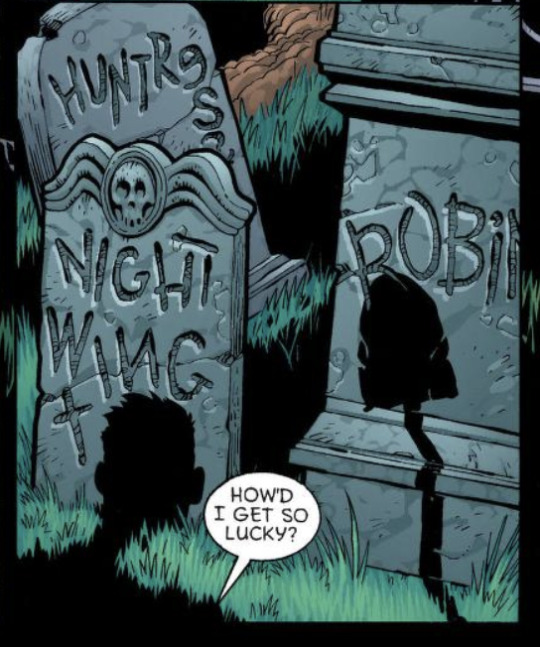
It’s unclear exactly how he died, but Joker kept Nightwing’s dead and rotting corpse alongside Tim’s and Jason’s.
Dick was brought back to life when the universe was restored by Mxyzptlk and Hal Jordan (as the Spectre) after Superman defeated Joker.
Time dead: unclear, but it appears to be multiple days and theoretically could be several weeks.
2. Briefly killed by Mr Fun (Batman: Family 2:7, 2003)
Dick was killed by Mr Fun, a skilled assassin working for a gang boss calling herself Athena (who was also CEO of Wayne Enterprises and trying to bring it down from the inside). Mr Fun crept up on Nightwing, hit him in the head with a golf club and then, while he was concussed and disoriented, used pressure points to stop his breathing and heart.
Cass fought Mr Fun off Nightwing, but Mr Fun shot her off the roof with one of dead Nightwing’s wrist rockets. When Cass recovered, Mr Fun had left (to kill the person they were supposed to be guarding). She returned to Nightwing and resuscitated him using CPR, which apparently cured his head injury too.
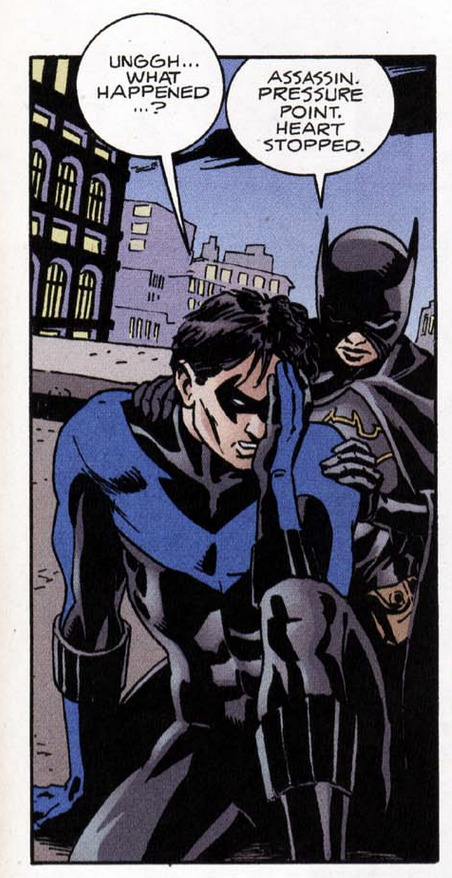
Time dead: long enough for Cass to fight off Mr Fun (which wasn’t easy) and recover from being shot down, and then give Dick CPR, so probably a good few minutes.
3. Killed and raised by Lex Luthor (Forever Evil 6–7, 2014)
Dick was hooked up to a murder machine involving a bomb wired to his heart, such that it could only be disarmed by killing Dick. Lex Luthor stopped his heart by making him swallow a pill.
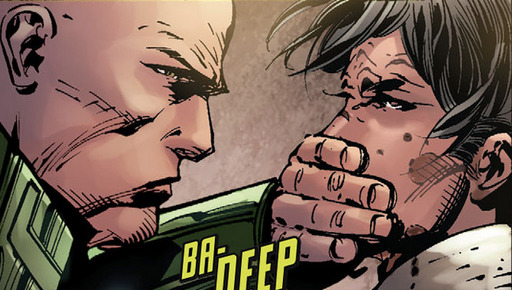
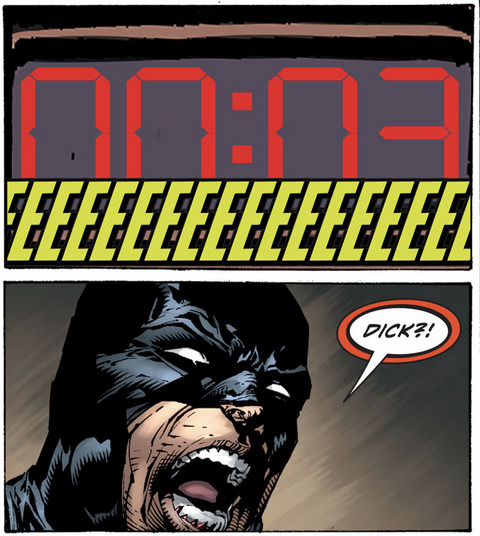
Batman of course then started going feral on Lex until Lex persuaded him that he could bring Dick back, which he did with a shot of adrenaline to the heart.
Time dead: long enough for Batman to get in a good couple of punches on Luthor, plus time for Luthor to detach Dick from the machine, so probably up to two minutes.
4. Beaten to death by groblins (Dark Nights: Death Metal 7, 2021)
Dick, along with other members of the Batfamily, was overwhelmed by a swarm of ‘groblins’: mindless evil Jokerised Robins invading from the Dark Multiverse, led by the Robin King (an evil child Bruce Robin). His death happens off-panel but we see his corpse lying on the ground.
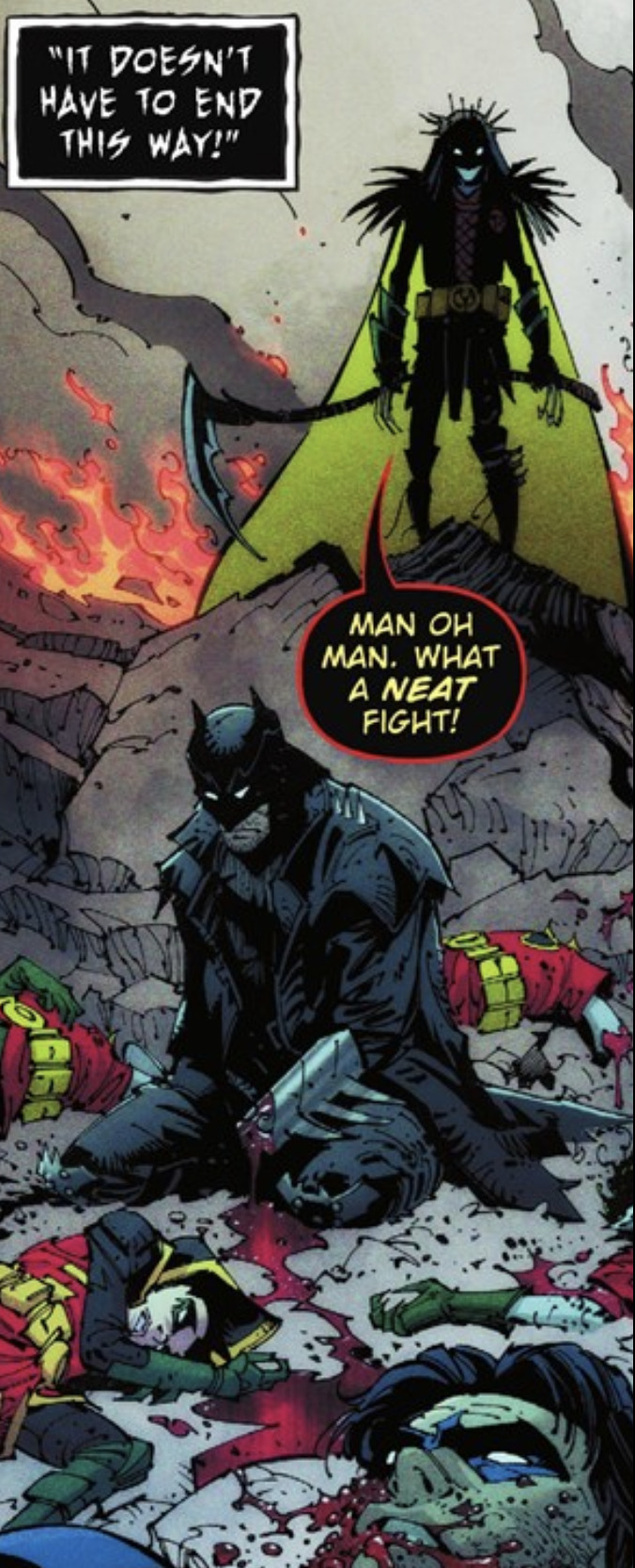
(Then Bruce, who was already dead and a Black Lantern, raised his dead family members as zombies.)
Dick was restored to proper life when Wonder Woman, powered by the determination of her friends, defeated the evil Batman Who Laughs and persuaded the gods to remake the multiverse as it was before the evil universes invaded the good ones.
Time dead: somewhere from quarter of an hour to an hour? Or perhaps a lot longer, if it took longer to rebuild the world. It’s always a little tricky to be sure when world remakes are involved.
5. Gave too much blood (Nightwing 4:124, 2025)
Dick found a gang of mutated and irradiated people who desperately needed blood transfusions. Being O Negative, he was able to donate his blood.
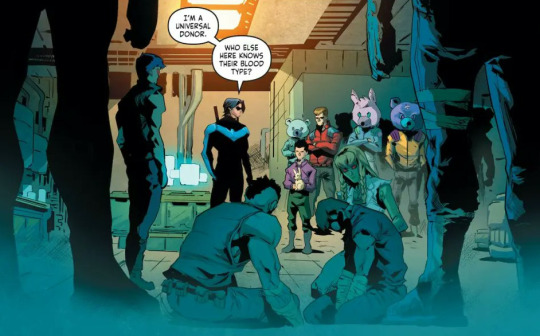
But he gave too much and died. His heart was restarted with a shot of adrenaline.
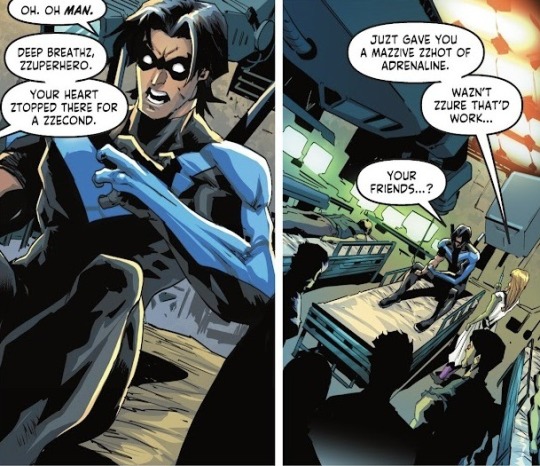
Time dead: ‘a second’ (probably several seconds actually).
Afterlife visits
A trip to Dis (Titans 1:4, 1999)
Dick, along with the rest of the Titans, signed a magic book created by a demon called Goth that summoned them to Dis, a region of Hell. Goth had positioned himself as an actor and superstar and got his fans to sign the book, then led them in a chant to transport them to Dis.
Kory was amongst those who had signed the book and was transported, so Dick and the rest of the Titans went after her.
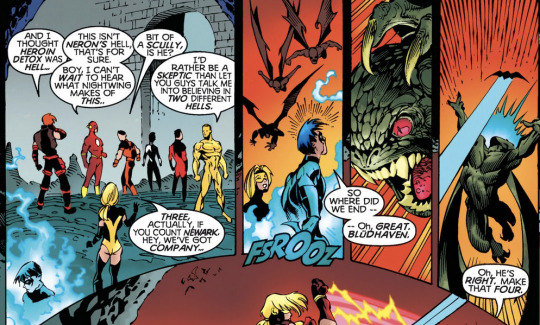
They discover that the way to get out is to find things to care about, and spend some time individually persuading people to care one at a time, but they start to lose hope, infected by the aura of apathy in Dis. Kory, who is less affected, attacks Goth and throws him down from a height, causing his fans to return to the mortal world because they are worried about Goth and the Titans to return because they are worried about Kory.
Time in afterlife: looks like several hours.
Hell heist (Nightwing 4:103, 2023)
Raven created a portal to bring Nightwing, along with Beast Boy and Cyborg, to Hell to find Blockbuster’s contract with the demon Neron, wherein Blockbuster sold the soul of his firstborn daughter, a nine-year-old called Olivia.
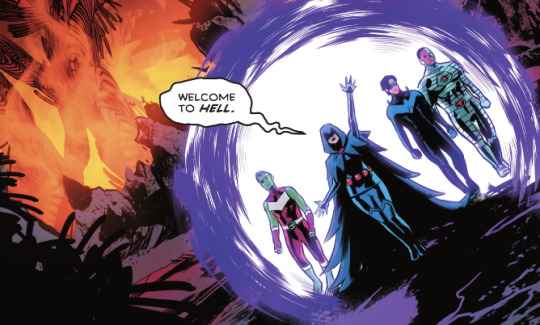
They found the contract and returned to the mortal realm, also courtesy of Raven. (Turned out Neron’s contract was easy to thwart: Dick just had to become a foster parent and assume legal guardianship of Olivia. Neron tried to tempt Dick with super powers, but while Dick very much enjoyed the free sample he was not even briefly tempted to give up Olivia for them.)
Time in afterlife: probably a few hours of travel, fighting, and research.
Batfam Death Project Masterpost
#batfam#batfam death project#deaths of dick grayson#dick grayson#corpses#if I find more death experiences for dick I will edit this post
219 notes
·
View notes
Text
I don't normally post fanfic ideas on here but I can't get this out of my head and I know I would never write it.
I've read some fanfics where Dick thinks about how Bruce's amnesia while he was in spyral could have been really disastrous seeing as Bruce had been his only point of connection to the outside world and his only way to get back up if he really needed it. There's probably a fic out there already like this, but what if he had really needed it? what if Dick failed his mission because Bruce was off in amnesia land and he couldn't get any help?
I keep thinking about if no one was allowed to remember him, not even his family. So when Bruce recovers from his amnesia, he still doesn't remember Dick.
Then a new villain, someone Bruce can't even pin down because no one knows his face. All Bruce can find out is that there's an evil organization out there looking for control, power, yada yada whatever. Bruce and his kids, and maybe other superheroes, work on tracking down the leader of spyral and despite never getting a good look at his face, there's something familiar about him. Something so familiar, it gives Bruce and the others headaches and they strangely hesitate to really hurt this guy.
And suddenly, Bruce remembers. He'd forgotten all about Dick.
With a burst of manic energy, Batman is searching through all his files during his amnesia stint, looking for clues as to what happened to Dick at spyral. At first, the rest of the batclan is confused at to what he's doing until they start remembering too and they start digging into OTHER files.
Suddenly everyone is grieving all over again and majorly pissed off at Bruce, but also glad that there's a possibility that Dick is still alive!
Idk where the rest would go like, would they forgive Bruce long enough to work with him again or at least until they got Bruce back? Would they abandoned Batman and work together to get Dick back?
Since its fanfic, I feel like you could obviously make it to where they some how get rid of the other person in Dick's body and bring Dick back but in my head, I kept thinking about how they could be so excited to get him back only to find out he is dead and that his body is just being puppeteered by some supervillain.
How awful would it have been for Bruce to have seen Dick DIE only to be resuscitated and then send him to his death. It would have entirely been his fault because he sent Dick there and left him with no back up plan if something happened to him like, idk, getting amnesia? I think the rest of the batclan would blame him for not telling them of this stupid stupid plan that made no sense, letting them grieve when Dick wasn't dead then causing his death and thus this second, arguably worse, wave of grief.
#i always hate writing about Dick because it makes it sound like im writing about dick :/#batfamily#batman#dick grayson#whump#fanfic#batclan#dc#dc comics#dupree#bruce wayne#spyral#agent 37#nightwing#dc robin
64 notes
·
View notes
Text
I’ve watched the first two Master stories from Classic Doctor Who Season 8, and here’s some fun facts and observations about the first Master:
A weird piece of music plays every single time he enters a room, with very few exceptions
Somehow he’s able to pull off a disguise whilst wearing an immaculate suit underneath
He’e prone to threatening people with the tiniest gun I’ve ever seen
Mostly unprompted, the Master told one of his minions that he admires the Doctor in many ways (they have such a normal friendship)
He left the Doctor a pretty (lethal) plastic flower
The Master killed a man with an inflatable chair
Upon hearing that the Master would be stuck on Earth and would probably be interacting with Unit more, the Doctor said that he was, quote, “rather looking forward to it”
At one point the Master ended up accidentally stopping one of the Doctor’s hearts, and it turns out that he is not the best at resuscitation (he was lightly whacking the Doctor’s stopped heart and then slapped him repeatedly whilst saying “wake up”)
Just after this, their faces got so close together that it looked like they were about to kiss, I have attached a picture below:

The Master hallucinated a giant, cackling Jon Pertwee because of an evil machine and he was cowering in fear
I just love this guy
99 notes
·
View notes
Text
So yeah, finally finished my eddie lives/steve gets powers S4 fix-it fic... going to get the ending up over the next 24 hours or sooner. It's all up now! Reposting the index post on the off-chance anybody is interested...
The Power of Love blurb: Steve has a habit of surviving near death experiences then getting sick for no reason. And Eddie and those fatal bat bites? After an impossible feat of mouth-to-mouth resuscitation from Steve, he’s mysteriously fixed. So, Eddie’s back to being banished, this time with Steve and Robin in tow. Eddie’s healing, but Steve isn’t… and life gets even more confusing, when Eddie develops feelings for Steve, which aren’t entirely unrequited.
(or, lots of angst, fluff, idiots to lovers, eventual smut and happy ending)
Part 1 below cut Part 2 Part 3 Part 4 Part 5 Part 6 Part 7 Part 8 Part 9 Part 10 Part 11 Part 12 Part 13 Part 14 Part 15 Part 16 Part 17 Part 18 Part 19 Part 20 Part 21
Part 1/Prologue:
Prologue:
“He’s gone!” In front of the trailer, Dustin sobs, cradling Eddie’s body in his arms. “He fought like Gandalf the White then sacrificed himself like Gandalf the Grey. He was the g-greatest hero—now he’s gone.”
“No. No way.” Steve rushes to Dustin, crouches beside him. “I know CPR. I got this.”
“What?” Dustin sounds more distraught than ever, tears dripping from his nose, spattering onto all that blood. Eddie’s blood. “Steve, what’s wrong with you? He’s. Gone.”
And Robin?
She stands there like a goose. Watching as the nightmare unfolds further, beneath that evil red-lightning-cracked sky. Not only, after all they’d done, is Vecna NOT apparently dead.
Eddie blatantly IS.
Tears blur Robin’s eyes. Dustin rocks Eddie’s lifeless body to the rhythms of his sobs. Nancy Wheeler—self-contained to the point of creepiness—stands beside her, stock still. Staring. Possibly trembling, though not as bad as Robin.
Steve, however, is still in the denial phase.
He’s gotten Dustin by the shoulders, jostling him away from Eddie. Physically dragging Dustin, then steering him toward Robin. Steve lays Eddie down flat, leans close over Eddie’s face, scrutinising for signs of life.
“Steve, you can’t help him.” Nancy sounds broken enough, reaching out. Not quite daring to touch Steve. “We’ve gotta get out of here. Let’s go.”
Robin kind of agrees with her. No way is she gonna back her up against Steve, though.
He brushes Nancy off anyhow. “I already brought two people back when I was lifeguarding. Neither were breathing. One’s heart was stopped.”
Nancy shakes her head. “The odds of even that are—”
“Christ, gimme space, Nance.”
Steve starts to administer CPR. Robin clings tight to Dustin, who clings back. She wants to close her eyes and deny any of this is happening, though… One miracle has already happened today, right?
That said, from what she’s gleaned from Dustin’s broken descriptions, Eddie’s sacrifice could’ve been the cause of said miracle. Ergo, it was not that miraculous. And possibly, all in vain. Either way, watching Steve work is killing her. He puffs into Eddie’s bloody mouth, then methodically crunches—possibly breaking—his poor ribs.
“Steve, enough!” says Nancy.
“No. I can do this.”
He squeezes Eddie’s nose, blows again into Eddie’s limp form.
“Steve, we—” Nancy gasps. Staggers back. Robin’s heart gives an actual jump.
“Eddie!” Dustin buries his fingers under his stupid little Ewok hood—was he supposed to look like an Ewok? She’s gotten no clue anymore—and throws himself forward, colliding heavily with Steve.
Robin’s witnessing her first undoubted miracle of the day.
Eddie’s eyes are open. He’s choking and spluttering blood and he’s... alive. Steve enfolds arms around him and raises him a little, tugging his collar, helping him breathe.
“I gotcha, Munson. You’re okay. You’re gonna be okay. We’re gonna get you out of here.”
The next few minutes pass in the blur. Eddie vomits out a ton of blood, which makes Robin gag too, so that’s fun. Then, shakily, with Steve’s help, Eddie rises to his feet. He’s a ghastly, greenish-white and looks… like somebody who’s just died. Which is fair enough.
He’s still not said a word. Which is not very Eddie.
“Are we sure,” Robin whispers to Nancy, “whether Steve has actually revived Eddie or if he’s been possessed by some twisted ghoul from the Upside Down?”
Nancy replies with an exasperated glare. Steve, meanwhile, hooks Eddie’s arm over his shoulder and makes for the trailer, face set with a grim determination. Robin helps Dustin, who’s limping badly.
They struggle back through the ceiling. Back out of the Upside Down, and through the place where Chrissy was mangled to death.
“It’s astonishing I’ve not been barfing constantly the past few days,” murmurs Robin to Dustin.
Dustin sniffs, rubs his pink eyes.
They’ve just exited the trailer back home, when that earthquake shit hits the fan again. A massive, fiery fissure swallows the trailer whole.
...
Chapter 1
Eddie POV
He figures he must be in shock.
He has no clue how he got where he is—sitting on a posh couch, in some open plan fancy-pants living room. His eyes are wide open, have been for some time, yet only now is he actually beginning to really see anything, to take stuff in.
Robin is staring at him, like…
…like I just died or something!?!
Some decidedly disturbing memories trickle back.
Oh. Shit.
She jabs at him with an antiseptic wipe, which she’s trying to smear up and under his distressingly blood-drenched Hellfire club t-shirt. The wipe is cold and stings like a bitch.
“Uuuuh, Robin?” His throat is raw, his voice wrecked.
“Eddie!” She springs up off the couch.
“What the heck is going on?”
“It is you, right? You’re not possessed, or—”
“Noooo. I believe it’s lil’ old me. I… I’m goddamn confused and have a distinct memory of… choking on my own blood.” Explains the gritty gunk lining his mouth and his throat, the disgusting taste. “And then… then…”
He’s pretty damn sure he passed.
When he tries to remember that part… Nope, his brain don’t wanna, so he’s not gonna. He sure as hell recollects the not-entirely-unpleasant memory of Steve Harrington’s mouth plastered over his, marred by yet more gargling with blood, then…
“Okay, I’m gonna take on trust you’re you.” Robin doesn’t sound convinced. “So… Henderson was adamant you were dead, but then… Uh, you weren’t. Awesome as Steve is at CPR, let's assume you never really were, or that death happens differently in the Upside Down, or you weren’t as badly hurt as it seemed, or something along those lines, because… Uh, not like I’ve looked everywhere, as I think we’ve all been violated enough today, but…” She facepalms, reddening beneath her freckles. “Sorry… prattling. As I said, I’ve not checked you everywhere, but… Eddie, you don’t even seem that badly munched.”
“Oh,” says Eddie. “Cool?”
Robin gives him a glass of water, and he takes a sip. Wipes his mouth on a table napkin lying close then takes a glug. God, he’s never been so parched.
She settles opposite him, on another plush couch. “Does it hurt?”
Eddie puts down the empty glass and performs a brief body scan. Sticks his hand up his shirt, which comes back predictably bloody, but it’s gritty, dry blood. His wounds have pretty much knitted up. “No. Well, it’s kinda itchy. Um, Where the heck are we? This place isn’t yours.”
“No. It’s Steve’s.”
“You’re kidding?” Eddie’s voice comes out embarrassingly high pitched. “His parents see me, they’ll call the cops and—”
“Chill. His parents are out of town. They’re literally never here.”
“Where’s Steve?”
“He’s… um… He said he fancied a swim. Go figure. Hey, you hungry?”
“Maybe some cereal,” mumbles Eddie, which is bullshit, because he’s not hungry. However, he’s starting to shiver, and he’s verging on losing his shit, and… he needs something to feel normal. He might as well try chewing cereal, because right now, he’s chewing his nails like he’s back in third grade.
I died. I goddamn died.
The glory of the Master of Puppets is way more of a distant dream than his recollections of being caught at the heart of that be-fanged whirlwind of death. That’s crystal-frickin’-clear. Those flapping fiends ripping into him, his defences faltering, his knees buckling… choking… drowning… the searing pain… and Dustin’s tears.
Crap, Dustin!
“There you go.” Robin dumps the packet on Eddie’s lap, a bowl and milk on a nearby glass table. “They only have the boring overpriced brands.”
Eddie stares stupidly at the packet. “Dustin… Is he okay?”
“Yeah. I mean, he’s shaken. I guess we all are. Wheeler took him to get his ankle looked at. He’s… thrilled you made it. He thought you were a goner.”
Yeah. I was. I really, really was.
“Robin, how the heck am I here?”
Her mouth opens. Snaps it closed again.
The sliding doors open, and Steve steps in. Momentarily, the undiluted horror of Eddie’s recent existence evaporates. Steve looks mighty fine, dripping wet, his modesty preserved by a small-ish towel around his waist. There are scars around his throat, fresh ones piled upon the old, though really, nothing that spoils that super-hot torso…
…until he lifts the hand he’s clasped on his side, where the bats had gotten him when they went through Lover’s Lake. It’s soaked in blood. The white towel tucked beneath is slowly turning pink.
“Oh my God!” Robin launches at him, as he staggers forward, swaying slightly. “Why the hell did you think getting your wounds wet would help, dingus? There’s literally no logic there.”
“Jesus, it didn’t make anything worse. Swimming always… uh… clears my head.” She grabs him and steers him toward the seating area.
They’re almost there, when the whites of Steve’s eyes flash up. He crumples limply against Robin, who squeaks at the sudden weight, and slings him toward Eddie’s couch to break his fall.
...
Part 2
Part 3 Part 4 Part 5 Part 6 Part 7 Part 8 Part 9 Part 10 Part 11 Part 12 Part 13 Part 14 Part 15 Part 16 Part 17 Part 18 Part 19 Part 20 Part 21
Also now on AO3
#steddie#steve harrington#eddie munson#steddie fic#steve x eddie#steddie fanfic#steve harrington whump#steve harrington x eddie munson
55 notes
·
View notes
Note
Hello there! I have a request for a Dr. Stone reader insert if you are willing! A Stan/Xeno/Reader one shot where they find out the reader struggles with self-harm? Please and thank you!
Okay, so! Right off the bat, I’m gonna say that if you are going through suicidal ideation and want to harm yourself PLEASE reach out and get some help. Trust me, I’m well aware of the dark spot you are in if you’re contemplating self harm, it’s not fun. Please don’t let the evil voices telling you that nobody would care if you left, win. Life is hard, but it’s very rewarding too, and there is no way that you have not impacted at least one person who would miss you. If you feel like you’re going to self harm at all, please please please reach out to someone. This is all fun and games, but this is still a very serious topic and I am begging you to stay strong and not go through with anything.
That being said, I am very rusty with these two, so forgive me if they seem out of character or needlessly mean at any point, I tried to keep the tone a bit lighter here. I hope this is a wholesome read, and I hope that anyone who reads it who needs help will get it.
CW: discussion of self-harm. Read with caution,
STANLEY SNYDER
Stan doesn’t come off like he’d care. He’s very blunt and matter-of-fact, and Xeno may have at some point traded Stanley’s emotional expression for the hard-working loyalty he has.
That being said, when it comes to self-harm, he’s pretty sweet about it. In his own way.
He wouldn’t outright acknowledge it, say anything, or really even ask about it. Stan doesn’t strike me as the type to outright speak about personal issues.
Instead, he’d simply glance at your wrists, make sure to feed you, give you water, let you vent to him if you decided to, and would basically sniff out when you’re in a dark place and pick you up for an outing or conversation so that you aren’t all alone and at risk of harm.
Stanley might also bit by bit hide dangerous items from you. Again, without any real comment, you could probably go weeks or months before you realize all of the small ways that Stan has done his best to help or keep you safe.
While he’s not a very emotionally chatty man, you can sure bet that if you’ve got nefarious plans, Stan will know. And he will intervene.
XENO HOUSTON WINGFIELD
Xeno is a lot like his best friend. He’s not the type to fret and worry over someone if they’re self-harming. He’d at most call you a dumbass for an attempt tbh.
Again, though, that’s not a sign that he doesn’t care. If you’re his friend, he cares about you a lot, he’s just an ass about it.
If Xeno found out you were self-harming, he’d randomly bring up the most painful, gruesome details about self-harm to dissuade you. Like the slow, painful way you’d die if you overdosed, how drug store ibuprofen is purposely made to not kill someone if they try, the pain that would come from cutting, or the challenge that is getting a noose to work right so you die instantly rather than slowly suffocating.
It’s a very morbid method of help, a very cold and cruel one, you could say, but I think it’s appropriate for a man who has very sparse ethics.
He would also find a way to resuscitate you if you did try. He would do that out of sheer spite because fuck you, you’re not escaping him that easily.
Xeno also might develop a bit of a dark sense of humor about it. Like asking if he could dissect you if you succeed, or saying he’d turn you into Frankenstein.
STANO
As a pair, these two would basically just help one another to help you.
Stan would take on a more emotionally caring role compared to Xeno, and Xeno would dissuade you and hide items from you.
Stan would still be the primary listener for the problems, he’d just report those problems back to Xeno too.
If it really is looking to be a very bad time, they’d effectively take turns talking to, distracting, and basically guarding you. They will hospitalize you if it’s necessary. Your opinion on the mental ward is of little importance.
Xeno would relish ripping apart anyone who may upset you or bully you. Verbally or literally.
In general, these two would just work together scarily well to lower your opportunities for self-harm. Granted, Xeno or both realize that a person dead set on something will find a way, but if you don’t have the alone time to get creative, you can’t do that.
#Stano x reader#dcst#dr. stone#Stanley Snyder x reader x Xeno Houston wingfield#x reader#headcanons#Xeno Houston Wingfield#Stanley Snyder#ask#dark
53 notes
·
View notes
Text
Dungeon Meshi Quick Reacts
CH.30 (Good Medicine)
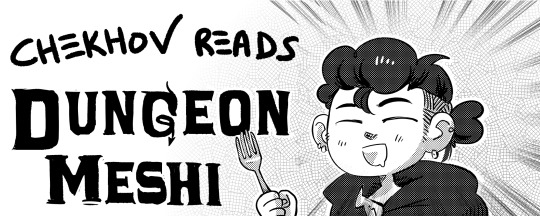

I kind of assumed that things would get worse from here...
...yeah, there's no 'but' to that. Getting Falin back so quick was too good to be true.
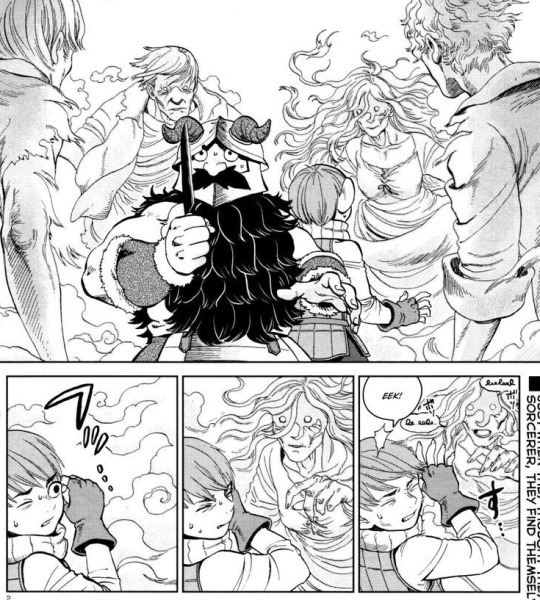
Aren't those the ghosts Falin talked to? They could be friendly.
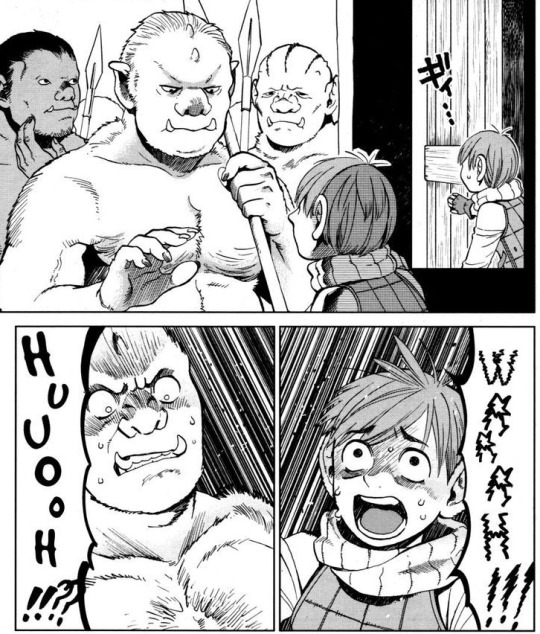
"ee gads! a hairless little man!" I'd be frightened too if Chillchuck was suddenly behind a door I'd just opened.
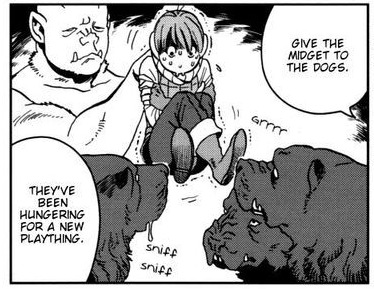
Chillchuck, buddy, less than 24 hours ago you threw a knife directly into a dragon's eye. You can take care of some worgs, right?

Senshi's a card carrying member of the smells-okay-to-me-chief club.
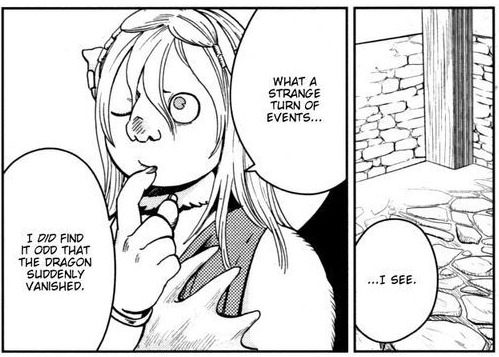
Orcs be like 'oh, dragon's gone? Hm. Curious' and then just carry on. Wouldn't you be worried that something took out the dragon? Could be even more dangerous than the dragon itself.
I feel like at this point Falin might be just that.
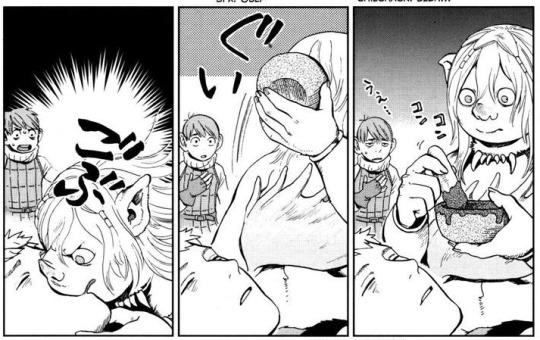
MOUTH TO MOUTH RESUSCITATION!
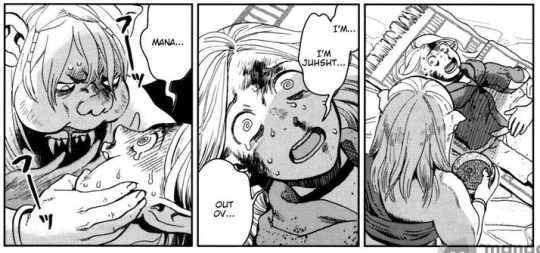
Marcille, I don't think you have a lot of options.
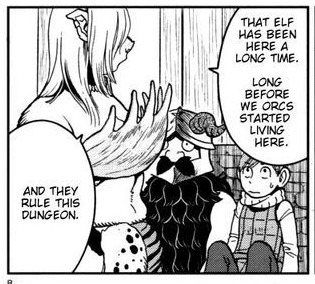
......just realized those moose antlers are holding up her rack. Talk about a pushup bra. Damn. Respect.
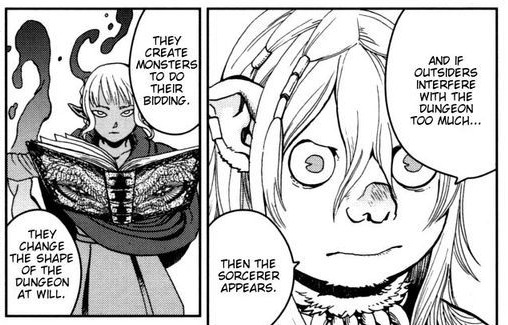
Wait go back to that "create monsters to do their bidding" thing again. Was that the little mini dragons or does that include larger monsters like the dragon itself?!
OR something that was IN the dragon, controlling its actions and make it act irrationally? Is that why the Sorcerer wasn't surprised to see Falin as a separate thing outside the dragon? Was the assumption that whatever THING it was had escaped and become Falin?
And for all we know... it kinda had. It had merged with her spirit....
Or maybe I'm way off.
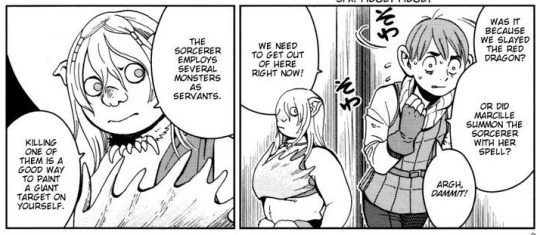
Congrats on the larger story plot! :D You're now in even more danger! Hoorah!
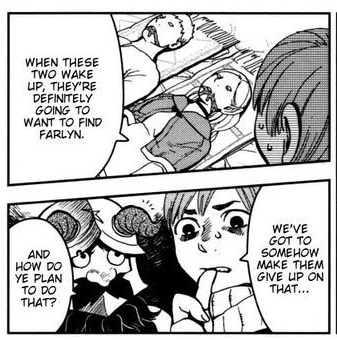
Chillchuck, a normal person would just go 'I'm leaving, pay me'. You're giving yourself away, worrying for them.
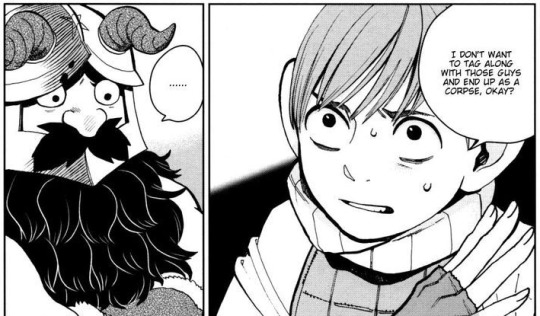
I can't hate him for the reasoning here. The deeper you go, the less likely you are to be found. The only person who cares enough about Marcille and Laios and Chillchuck to find their bodies are.... each other. So if they're dead here, they're likely dead-dead.
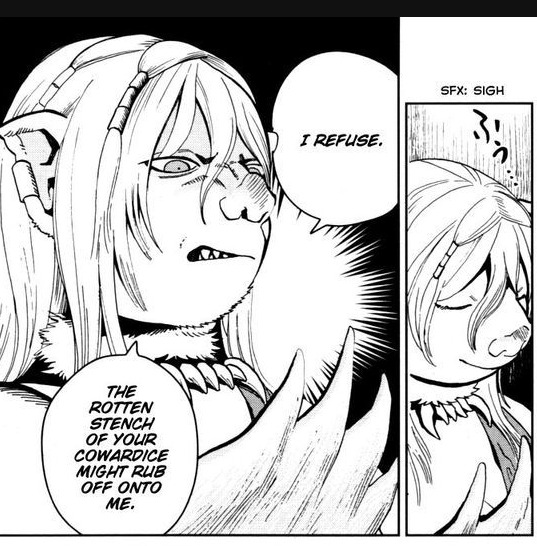
I want to nestle into her bosom and live there as a little creature.
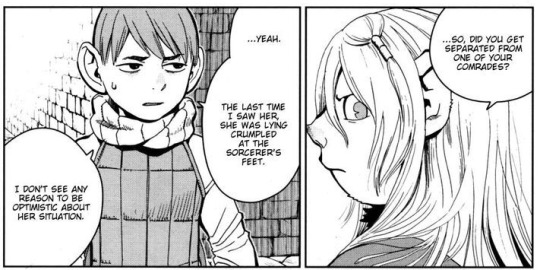
Moreso than when she was literally in the gullet of a red dragon?! Come on, be reasonable. At least she's alive now. And remembers who she is.
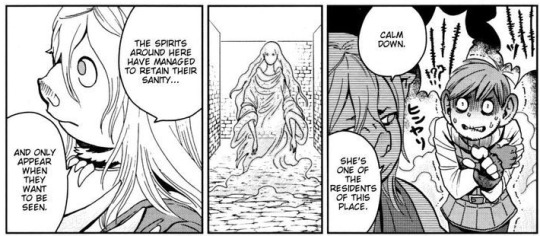
Ooooh friendly ghosts. Makes sense why Falin was so chill about them.
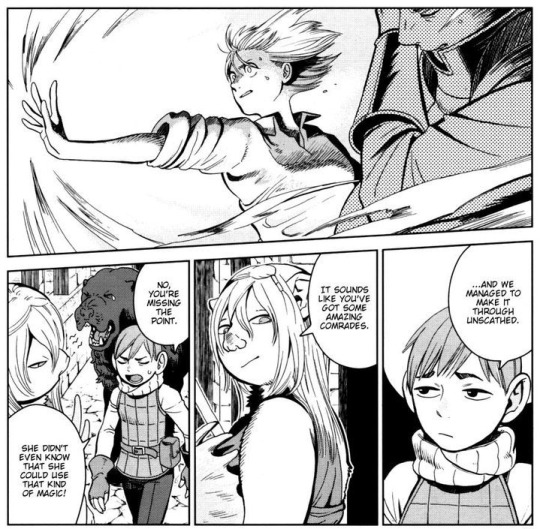
All the more reason to believe there's something to be done!
Love the doggo yawning behind Chillchuck.
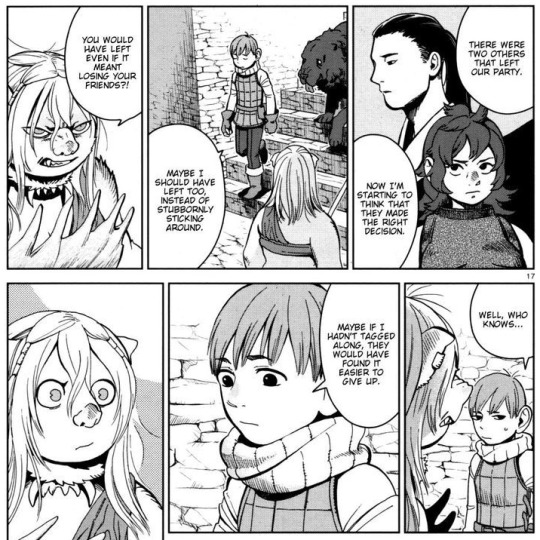
He's a coward, but being afraid isn't necessarily a sign of weakness. It's a sign that you realize how dangerous a situation is. Cowardice isn't stupidity, no more than ignorance of danger is bravery.. I think the orc leader is maybe realizing he's not doing it for completely selfish reasons. Mad respect to her though.
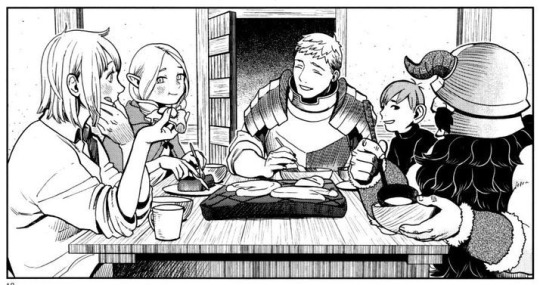
It WAS Falin, wasn't it? It wasn't as if it was a thing pretending to be her. She was there, and she was revived successfully, and then the soul confusion thing happened.
......damn. What a small holiday they got, before the next horrible thing happened...
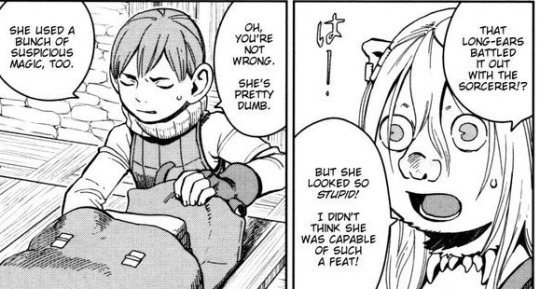
hey, Marcille is not dumb! She's got loads of braincells! they're just all focused on doing evil stuff and being gay.
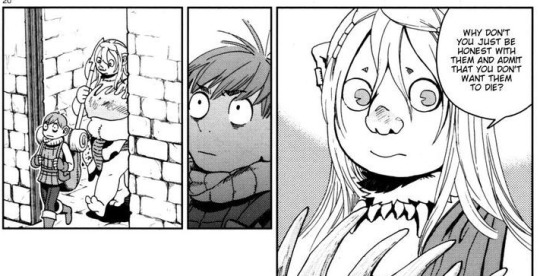
🎯
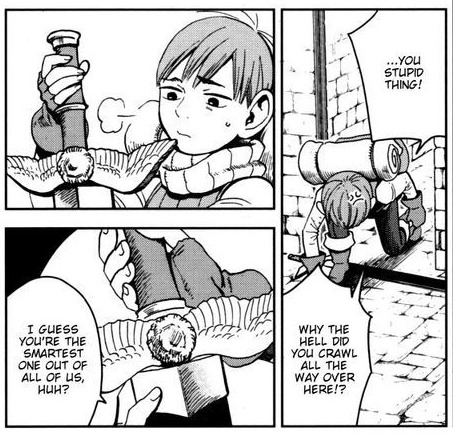
That's right! It's just like you, Chillchuck!
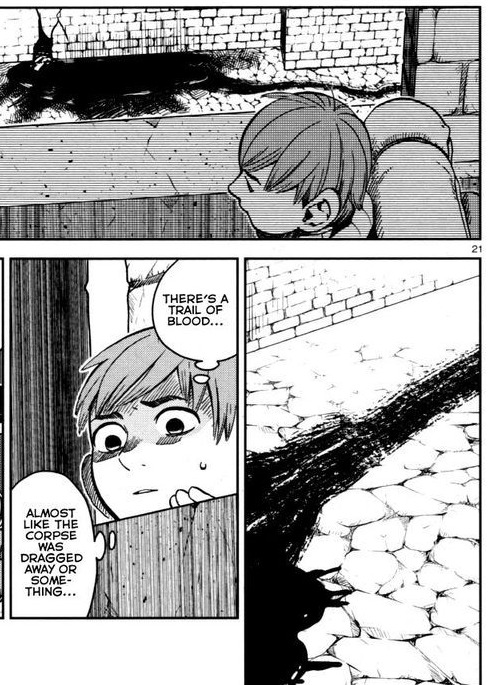
Was that... there before?
Oh, okay, no, it was. Hm.......
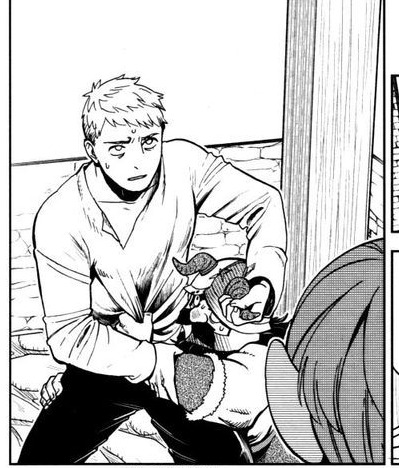
This stupid man is about to full a Falin and jump out a window to go look for her, isn't he.
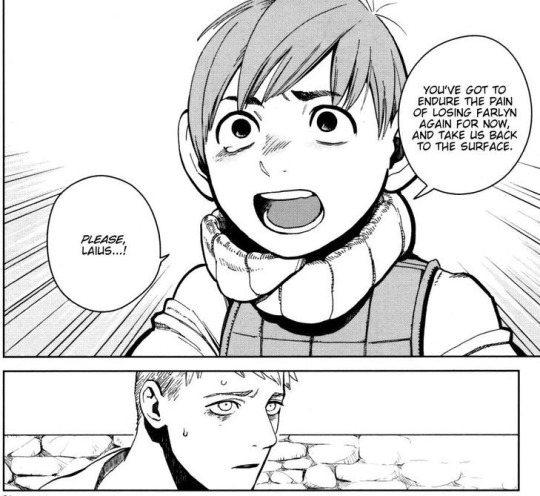
Gods, this sucks for him so much. For all of them. Because they.... they WERE successful! They rescued Falin! They brought her back from the head! They DID that!
But now, instead of getting the reward of it, she's just gone. Is it better, because she's alive?
Or worse, because the threat is even more nebulous?
If they all died, would it be worth it?
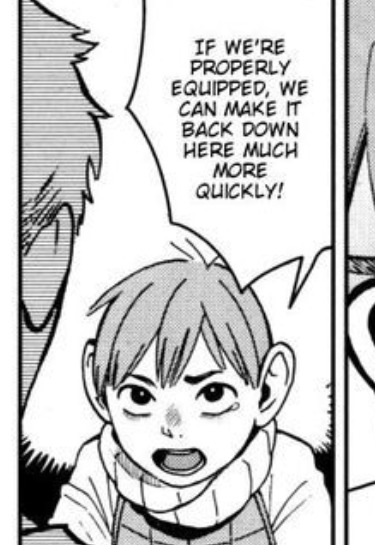
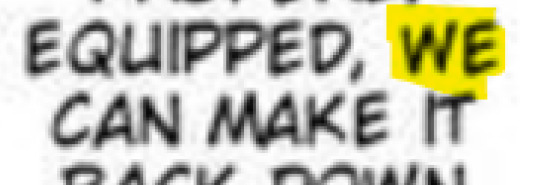
who's the coward...? he's ready to go back.
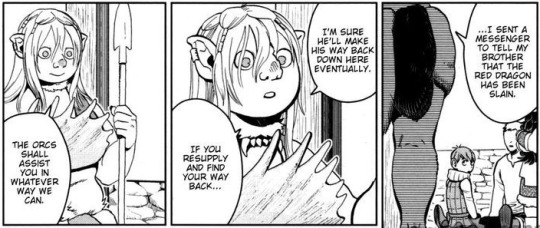
For Falin, they went down there. They risked themselves.
For them, after talking to him only a bit, the orc leader went from 'hey, nice snack for my dog' to 'we're helping you get that girl back'.
It's about the CONNECTION!!! IT'S ABOUT HELPING EACH OTHER AFTER LEARNING TO UNDERSTAND ONE ANOTHER!!!

330 notes
·
View notes
Text
"Why doesn't Dick tell Jason he killed the Joker" because taking a life is one of Dick's greatest regrets and to Dick perpetuating the cycle of Joker's violence does not prove that he loved Jason or cared that he died, it just shows that Dick is capable of the same cruelty and disregard for human life as the evils he fights against when pushed. Moreover I don't think Jason would react positively to that info because
a. The Joker is still alive which would again prove to Jason that his death didn't have an impact and
b. Jason wanted Bruce specifically to kill the Joker to prove that he loved Jason/cared that he died, so if anything finding out that not only did someone, who was not Bruce, kill the Joker but that Bruce resuscitated him would probably just hurt Jason more.
TLDR it's not about Jason's catharsis that would not occur it's about Dick's regret at breaking one of the core tenants of his moral code
#dick grayson#nightwing#jason todd#red hood#bruce wayne#batman#the joker#bitch i might wing#I see this in fan fiction and it's a feel good moment#but I think they would both leave that conversation with -5 hp
310 notes
·
View notes
Note
I feel like we were all anticipating the moment Katsuki gets put out of his misery and finally holds Deku’s hand— only for it to get off-screened! That was the biggest plot twist imo. Why do you think that was?
I mean, to be fair, we DID see them hold hands when Katsuki was resuscitated, but I was openly not satisfied with that being all we got lol.
Maybe it'll be on-screened in the anime. A girl can hope.
As for why? Man, I don't know. Time/space constraints? Evil editor conspiracy? Horikoshi blushed too hard when he tried and threw it in the trash? I don't know and I could drive myself crazy thinking about it or move on with my life and ask the fanart community to rectify this for me. One of those sounds more fun.
86 notes
·
View notes